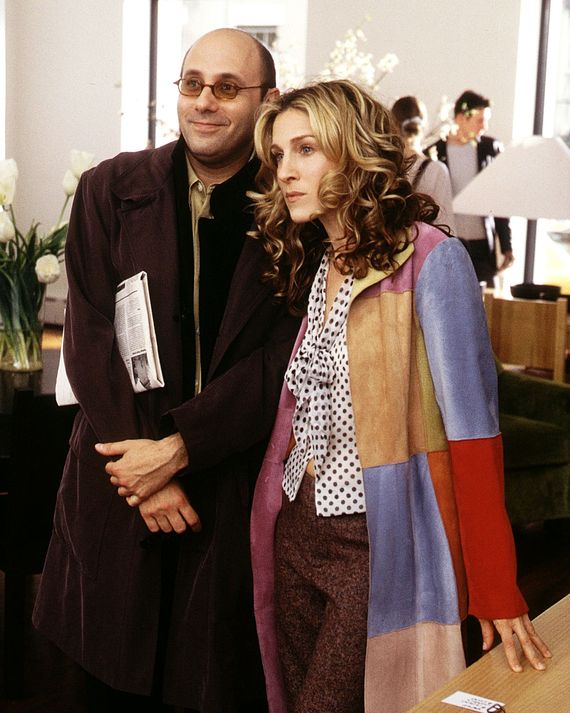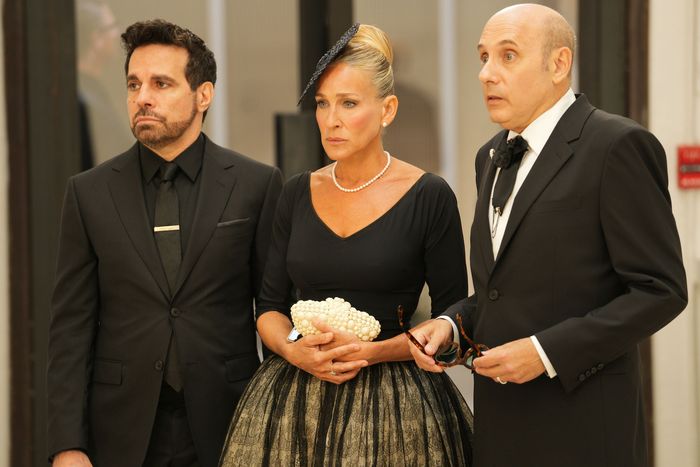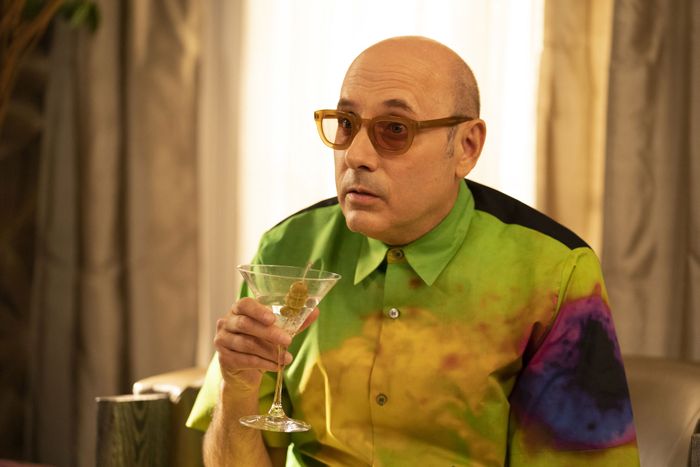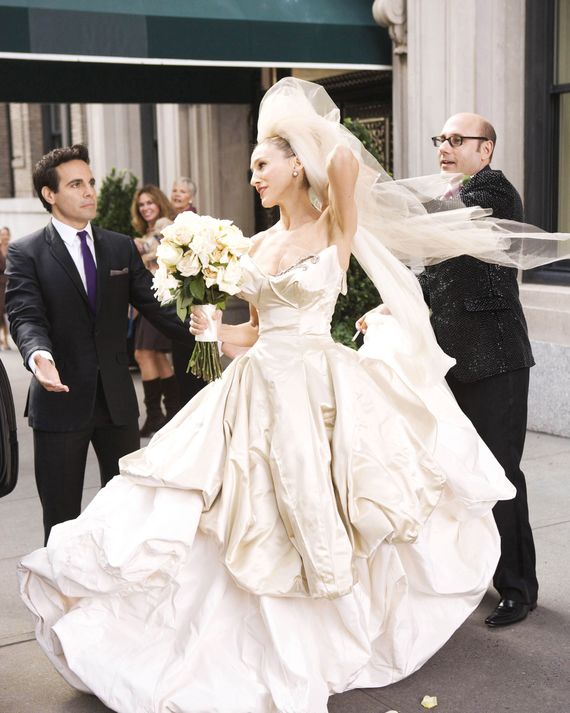
It’s been three months since Willie Garson died at the age of 57 after a yearlong battle with pancreatic cancer, and this week, audiences bid adieu to his most-loved character over his decades-spanning career. Co-starring on HBO’s Sex and the City and its HBO Max sequel series And Just Like That … as Carrie Bradshaw’s gay best friend Stanford Blatch, Garson served iconic fashions and one-liners — with a martini in hand — till the very end.
To hear star and executive producer Sarah Jessica Parker tell it, And Just Like That … was meant to roll out Stanford’s most significant story line yet, a journey that was tragically cut short when left the series to focus on his health after episode three. While Parker demurs at sharing what, exactly, that story line had in store for her longtime friend in fear of “hurting people’s experiences of the story we are now telling,” Cynthia Nixon, who stars as Miranda, will always remember him on this project as the “fourth girl,” after Kim Cattrall declined to return to the franchise as Samantha.
Before Stanford Blatch takes his final bow, Vulture asked Parker, Nixon, Kristin Davis, and Garson’s other Sex and the City colleagues to share their memories of working with him.
Sarah Jessica Parker (star and executive producer of Sex and the City and And Just Like That …)
Willie and I have been friends for, gosh, 30-some years, long before Sex and the City. Our friendship onscreen is similar in many ways to our friendship off, which is not typical. Cynthia and I have known each other for even longer than I’ve known Willie; we started working together when we were little girls, but Carrie and Miranda are different than Sarah Jessica and Cynthia. With Stanford and Carrie, though their lives and choices are radically different than our own, there was a buoyancy to their onscreen relationship that felt familiar to us. It was a joyful one onscreen.
I knew before we started shooting that Willie was sick. He asked me to keep that confidential, and I honored that. It was fraught for me to know that he was sick with that particular, terrifying diagnosis. We were a vaccine-mandated show, but nonetheless, a lot of our scenes were with a lot of background players, and I had great concerns about Willie staying as healthy as he could while shooting. I couldn’t share that with anybody. I’d only keep track of him, and I felt responsible in some ways for his health, his well-being on the set.
Anytime there was downtime, I sat with him and talked with him. He really was a raconteur, a famously gifted storyteller. We could hear the same story over and over again as if it were the first time, and he was terrifically good at documenting his life and sharing it with us. He worked with a lot of really famous people and legends, and he loved telling us about those experiences. The thing I’m sure you’ve heard countless times, and you’ll certainly hear from me, is that after being a father, the thing he loved best was working. He was as cynical as the next person and funny and snarky about some of the things that accompany sitting around on a set, but he loved being a working actor.
What we called for many months “the Black Event” was particularly difficult for me and for all of us. At that point, he shared with his fellow cast that he was sick. That day was excruciating, to be in a fictional world of the loss of a life, but in the real world, of somebody that you knew was sick — that was his last day working with us.
He intended and wanted to complete the entire season. He had a very significant story line, more so than ever, so it was my fervent hope that he would be able to do it all. And for Willie to have to leave, you knew that it was serious. If Willie could be there and do one more episode or one more scene, he would have done it. But he knew what he needed to do to take care of his son and of himself, and I am so glad that he did that because when he passed away, he wanted to do so in an environment and circumstance that made him feel safe and comfortable.
He found a place in a business that he wanted to be in and loved. He almost never said no to a project. He would call me and say, “Here’s where I am and what I’m doing,” and often it was just because he wanted to travel to a place far away and eat great food. That’s what we talked about a lot: our love of food and being in the unfamiliar and finding a local place. The beauty of what we get to do as actors is that we get to be other people and have experiences. One of the things he said to me in our last conversation was that he got to do it all. He was like me; he was a curious, insatiable person. He wanted to taste it, smell it, live it, feel it, know it, understand it, and walk away with memories. And he did. He had no regrets. What a deservedly gorgeous place to be.
Cynthia Nixon (star of Sex and the Cityand star and executive producer of And Just Like That …)
Willie had so many interests. He was a big fan of the Saints, the New Orleans football team; he was a restauranteur, a world-class gambler, game player, and a collector of all sorts of things. My family always gets our glasses made at an Chinatown optometrist; the guy recognized me the first time we went in there and was like, “Oh, you’re from Sex and the City! Willie Garson, he’s one of our clients.” I think he had that in common with Stanford: Although it was expressed differently, he was kind of a clotheshorse. And he never struck me as an overtly political person, but he was always so interested in the politics I was interested in. He wanted to hear about it, and that always really touched me. Then all of us were so thrilled, and also, frankly, surprised when he decided to become a father. I know a number of single women who have made that decision, but Willie might be the only single man I know who has been so brave and proactive in taking the bull by the horns and knowing this is something he wanted in his life. He just went out and got it.
In And Just Like That …, there’s that moment when Carrie has Stanford come over instead of Charlotte, and Charlotte is very hurt. And then Stanford says something completely off the wall, and Carrie is like, “And that’s why I had him come instead.” He can right any situation, no matter how fraught it is, and that’s reflective of who Willie was as a person. Oftentimes, Miranda is not in a scene with Stanford, but we had that scene in Carrie and Big’s apartment, and we got to spend the day together. We were drinking — we obviously weren’t drinking real alcohol, but it gave it a festive air. Willie was, as he always does, telling so many show business stories about his life, and because we had so much time together, I got to ask him questions about his life that I never really asked him before.
When he started to get really sick, Sarah was the only person that knew, and it got to a point where we had to be told. She called me and Kristin up individually on Sunday and told us, and then we were able to see Willie and shoot with him the next couple of days. He’d been, as he always was, so lighthearted and funny and engaging. I have to say, I’m so grateful we had those two days together with us knowing he was ill and him knowing that we knew and that we could talk about it. A number of the other people, like David Eigenberg and Evan Handler, hadn’t been told, but Willie told them during those big scenes those days, so I think it was kind of like a coming-out for him, in a way. It’s so enormous and so scary and painful. It is an extra burden to carry it and not reveal it to anybody.
He’s in the first three episodes, and there’s this running gag that Stanford is basically trying to become the fourth girl. It was a joke-y plot thing, but so many things in our show are taken from what’s really happening, and in some of the scenes we shot with him, I did feel like he became the fourth girl. I wish we could have had more of that this season. We all pulled together and tried to fill the hole the loss of that character meant, but it’s very hard. Willie’s sparkle and magic are very rare and very particular to him, and when he’s not there, you really feel it.
Kristin Davis (star of Sex and the City and star and executive producer of And Just Like That …)
I first met Willie in 1995 in Vancouver at an abandoned hospital used for a night shoot location on The X-Files. I was waiting around, and Willie started talking to me and immediately made me laugh. He created such a sense of ease around himself. He could and would strike up a conversation with anyone, and you would feel like you had known him for years.
In 1997, we both ended up at the HBO office testing for Sex and the City. I had already had a few auditions for Charlotte, and I was really nervous, so seeing Willie there made me feel better. This was in the days of the fax machine, and the office fax machine had broken down while printing out all the actors’ deal paperwork, so we had to wait for hours until each contract had been printed out. Willie and I talked and laughed. He told me about his friendship with Sarah. Luckily, we both got our parts on the show.
Willie was friends with almost everyone in our industry. He had an intense ability to connect with people — that is key to being a good actor, I believe. There was always a lot of energy when Willie worked. He was quick-witted and so smart and insightful. I remember he was on another HBO show after Sex and the City ended, John From Cincinatti, and I went to the premiere. I hadn’t seen him in a while, and he picked me up and twirled me around, and I felt so lucky to be friends with him.
We have a scene together in the new show where Charlotte and Stanford are alone, and we filmed that scene before I knew of his diagnosis. There was a moment when we were sitting together in our chairs between takes and he said, “That was fun,” and something about the way he said it caught my attention. I look back now, and I feel like he was talking about our whole wild ride together. It is gut-wrenching to think of all that he was carrying at that point. There were other times on set for the new show that I reflect on now and see a deeper meaning. I don’t feel like I should share them all; I will just say that once his health took a turn for the worse and I knew what he was dealing with, I went to him at work and we just hugged and cried together.
Michael Patrick King (writer, executive producer, and director of Sex and the City and And Just Like That …)
I first met Willie when he started Sex and the City. Of course, he was playing Stanford Blatch, an odd name for a character. As a writer of an ongoing TV series, you start thinking: Who is this actor, and what do they have as a person that I can steal to make a character with a name like Stanford Blatch real? The first thing I was aware of was Willie’s sly, stealth humor. Never in your face, always something you had to lean in to hear. And it was always worth the lean in. And his grin — his knowing, secret grin. Like the Cheshire cat, really; just off to the side, watching, a little wicked, a little charming, a lot mysterious. Those are the qualities I pulled into Stanford from my “entry-level” knowledge of Willie.
I was directing him in a scene in And Just Like That … where Carrie asks Stanford to run and hide from Charlotte, who’s at the door of her apartment. He runs with a martini in his hand — something I wrote specifically for Willie, just something so silly. And because it was Willie and he’s endlessly inventive and funny, I kept giving him different ways to run: Run like you’re a linebacker! Run like you’re a little girl! Run like you’re on fire! And every version just kept getting sillier and more fun to watch, and Sarah Jessica and Cynthia and Kristin could not stop laughing. Even when you think, “This still can’t be funny,” he kept going because Willie was enjoying the challenge and the camera time so very much. Willie loved his camera time. The bittersweet part of that memory for me is that he was very, very sick at that point, and no one on set knew. He just kept going and lit up that whole soundstage.
My final interaction with Willie came when I spoke to him on the phone about a scene I had written for him to come in and do with Sarah Jessica — just Carrie and Stanford. It was a scene to explain his absence in the series. He was very realistic with me; he said, “Please, don’t think I don’t want to do it — I can’t.” When I remember my time with Willie, the first thing I’ll think of is his love of being an actor. Every part of it.
Patricia Field (Sex and the City costume designer)
I had a wonderful relationship with Willie. He loved his wardrobe more than anyone. It was a big, colorful, expressive wardrobe, which suited his personality. Once he saw and understood my ideas, he agreed with them. He really gave me all the freedom I wanted.
At the time, this British couture designer by the name of Ozwald Boateng had representation in New York, and we were able to borrow samples, as Willie really was the sample size. The suits were colorful, and they were couture. They were beautifully made. But it was the colorfulness that I equated with, not only Willie’s personality, but the way he delivered the character. I say that sugar melts quickly, and unfortunately, Willie was sugar, and he has melted away, which makes me very sad.
Mario Cantone (Anthony Marentino)
The first scene, the blind date, that was the first thing I did with him. That’s when I met him. I loved him right away. He’s hilarious and biting and viciously funny. We connected right away. And then, you know, we hated each other on film, and then we got married! It’s so funny because in the first movie, in that beautiful New Year’s Eve segment, we run into each other, and we end up kissing, and I was like, “Okay, if there’s another movie…”
I was lucky because he came before me, he was the original on the show. To have two gays on one show back then was very rare, so I was lucky that I got to stick around, and I think marrying us was a great thing. It put us together. Plus, Liza Minelli married us! That was a thrilling day, marrying Willie on camera. It was very emotional. Both my sisters walked me down the aisle. You really can’t see it because it’s unfortunately a far shot, but my sisters — one of my sisters passed away a few years ago — they took me down the aisle like real sisters. And then I remember watching Liza performing. Willie and I were standing together and clapping and loving it. She sang a song off-camera, a Cole Porter song called “Every Time We Say Goodbye.” She sang that for all the extras and the crew and the actors. I’ll never forget that.
Working with him on And Just Like That … was magnificent because he’s just on his game. I don’t know if there’s one season of this or many — I have no idea what the future brings — but he’s terribly, terribly missed. It’s not going to be the same. I got to set the day after he passed, and I just broke. Sarah Jessica grabbed me and she took me out because that’s how she is, she takes care of people. I’m sure she had her moment the day before when it happened when she was told. I mean, we all did. But I had mine a day later, and I felt very taken care of by her and everybody on the set. It was very hard that day. But we all huddled together and loved each other hard and kept going.
Chris Noth (Mr. Big)
I can’t say I was Willie’s closest friend — I wish I had been. We did spend time on the show together, but rarely in the same scene. I envy those who spent many of their days with him. He was the most fun and engaging man — the kind you’d want at your dinner party or just to hang with. He was so curious and full of life, always ready to jump into any subject with gusto — and boy did he have opinions! Laughter was part of what Willie brought to the table. His name will always bring a smile to my face. For even in the limited time I spent with him, to know Willie was to love him.
Evan Handler (Harry Goldenblatt)
Willie’s work as Stanford is the kind of work I love. It stretches the limits of what the material can take in terms of the size of delivery, but it’s rooted in something very honest. People enjoyed Willie’s performance, I think, because they saw something real and from the heart that was also playfully performative.
Sex and the City was the first thing that brought us together, but it didn’t bring us together personally. Almost all my material was with Kristin, and only occasionally were there big scenes involving everyone. I didn’t have much to do with Willie in the show, but we knew each other; we’d had a warm, nodding acquaintance. The thing that tied us most closely together, from my point of view, was that I was endlessly mistaken for him! I was live on CNN, during which the interviewer asked me over and over again, “So, you’ve played so many gay characters. Can we talk about some of that?” Then I went, “You know, not really that many.” And the interviewer laughed and laughed. And then he kept asking me questions about the gay characters that I played. And I kept saying, “I can’t really even think of one.” I didn’t know how to handle it. I said, “I’m sorry, but I think you have me confused with another cast member. You know Willie Garson plays the gay guy on this, right?” He just crumbled live on TV. What else was I going to do? So I felt bonded to Willie by something that had nothing to do with an actual connection between us.
Probably the most in-depth communication I had with Willie was on the day during our filming of And Just Like That … when he went over one by one and revealed to us the diagnosis he was dealing with. He delivered it in the sense that he thought he was going to pull out slightly, have somewhat less to do with the show. And then it was a matter of days before he disappeared completely. Willie told me about his diagnosis and the fears he had about it for his son. And for me and him, in particular, it was poignant because he knows my history of having survived acute myeloid leukemia. I really can’t believe the burden that Willie was carrying. I oddly became closer to Willie through his sharing that information with me at the very end. He is sadly missed. I wrote to him via text message after he had pulled out of the production and told him that set was not the same without him.
These conversations have been edited for length and clarity.





